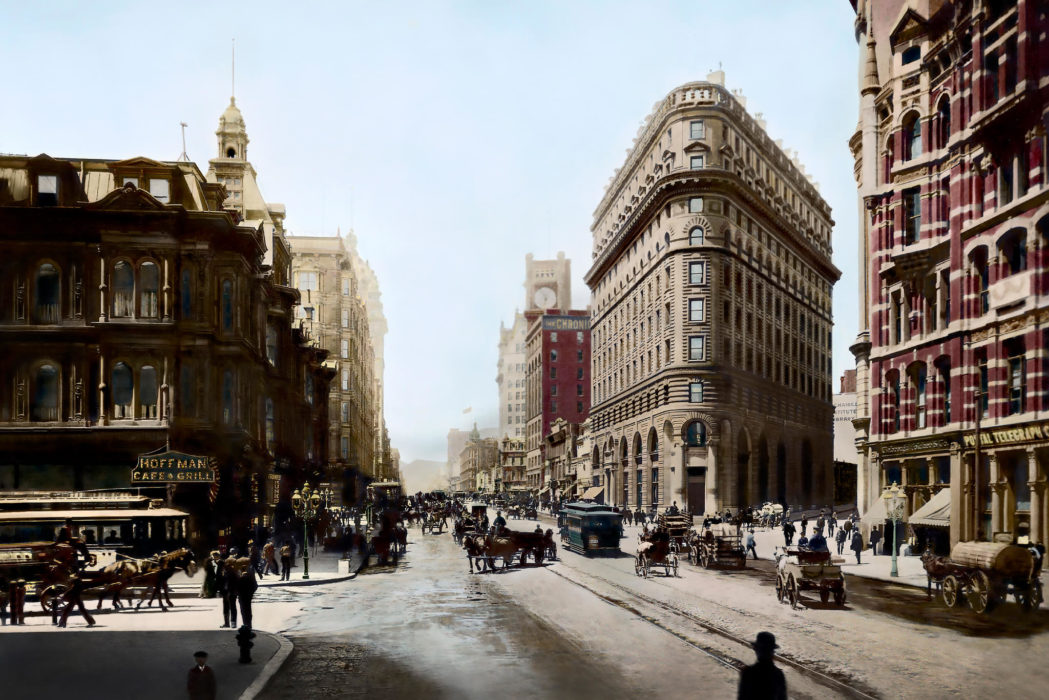“MY GREATEST HAPPINESS THIS morning is this,” ‘Abdu’l-Bahá told a reporter from the San Francisco Chronicle on October 3, 1912, “That I have come to such a modern and progressive city. Praise be to God everything is beautiful and there seems to be much joy here.”
It was morning in San Francisco in more ways than one. Much of the modern, progressive city ‘Abdu’l-Bahá saw around him in the morning light was, in fact, brand new, having risen from the smoking rubble of a catastrophic earthquake six years earlier. At 5:12 a.m. on Thursday, April 18, 1906, the Pacific and North American tectonic plates shifted fifteen feet along the San Andreas Fault. For forty seconds in San Francisco hell roamed the streets.
The tenor Enrico Caruso was asleep in his bed on the fifth floor of the Palace Hotel on Market Street when the shaking began. “I wake up about 5 o’clock,” he wrote in 1906, “feeling my bed rocking as though I am in a ship on the ocean . . . I see the buildings toppling over, big pieces of masonry falling, and from the street below I hear the cries and screams of men and women and children.”
The earthquake, followed by the fires that raged out of control for several days afterward, razed eighty percent of San Francisco, but not the old mansions here in the neighborhood of Pacific Heights, where visitors crowded around ‘Abdu’l-Bahá on his first morning in San Francisco.
The house he rented at 1815 California Street, a three-story Italianate Victorian mansion, was made of stone and light-colored brick, and seated itself at the northwest corner of an almost square property just a block up the steep hill from Van Ness Avenue. Eight marble steps rose to the front door beneath the overhang of an arcade porch supported by Ionic columns and decorated with pots of flowers. The main floor comprised a single large hall — standing room only every morning and afternoon — which was cordoned off into separate spaces by heavy velvet curtains.
‘Abdu’l-Bahá received guests on the second floor. From his corner room he could gaze out over the descending cobblestone streets to his right, past the sandy-colored Mission Revival church at the corner of California and Franklin, and then into a wide panorama of the city that sparkled at night.

The Chronicle reporter showed ‘Abdu’l-Bahá a copy of his newspaper, which carried accounts of the lead-up to war in the Balkans. ‘Abdu’l-Bahá asked if actual hostilities had begun, and then asked: “Will the Chronicle take a message from me to the American people?”
Yes, the reporter replied, and then began to scribble. “The United States has in reality made extraordinary progress,” ‘Abdu’l-Bahá began. “They are not engaged in warfare with any nation.”
Such independence from petty international squabbles made America unique among the Great Powers. “First, the nations are rivals with each other so far as commercial advantages are concerned. Second, they are thinking of national self-aggrandizement. Third, they are thinking of planting new colonies. Therefore, it is difficult for them to step into this field, to uphold international peace, because they are contending, warlike, victory-loving people.”
On the other hand, ‘Abdu’l-Bahá asserted, “The American democracy is not founded upon warlike doctrines. Hence it becomes this democracy to uphold international peace and spread it throughout the world.” But he was advocating more than diplomatic niceties. America, he said, had the ability to use its moral suasion and industrial power to forge an international court of arbitration backed by a binding global collective security agreement that could banish international war. “In case any Government or nation should prove rebellious concerning any decision of the court,” he told the Chronicle, “the other nations should coalesce to force it into obedience.”
“A more fervent hope and a fonder desire concerning the American people,” he concluded, “is that their instrumentality shall be such as to enlarge the scope of this scheme and that earnest concerted action from the nations of the world will result therefrom.”






